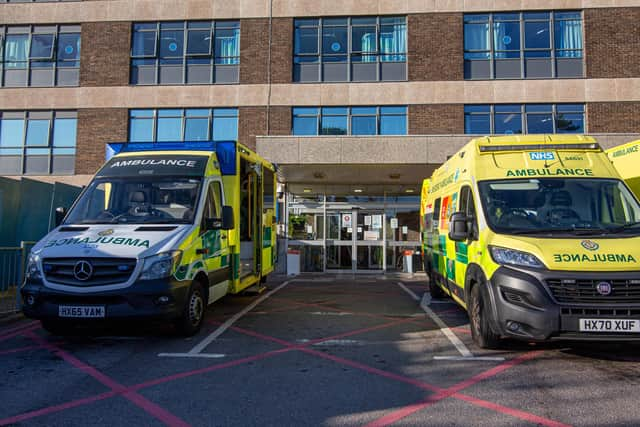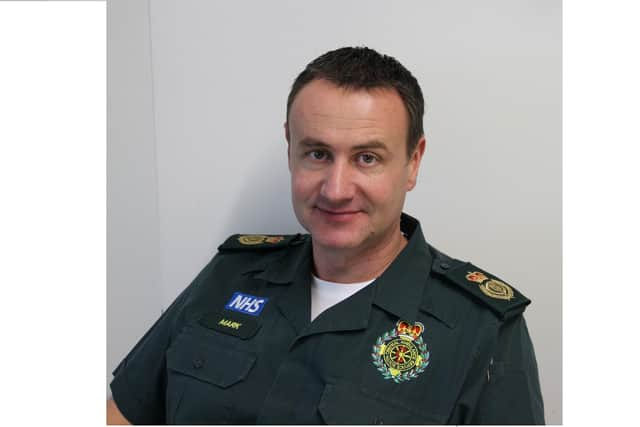More patients treated in South Central Ambulance Service vehicles as 'extension of Queen Alexandra Hospital A&E'
and live on Freeview channel 276
South Central Ambulance Service (Scas) has even called for military intervention as ‘exhausted staff’ look for help to stem the flow of huge demand as it fields 4,500 calls a day from the public.
The plight of paramedics has been exacerbated by the situation in Portsmouth - viewed as the ‘most challenging’ area to serve across Scas’ regions. This has been put down to Queen Alexandra Hospital’s bed capacity being full to the brim.


Advertisement
Hide AdAdvertisement
Hide AdThe predicament has forced paramedics to treat customers in car parks outside while they wait - with this being pushed more as an approach to avoid patients unnecessarily going into hospital.
It comes after hospital bosses told The News they were starting with just a ‘handful’ of beds each day.
Last week, 500 paramedic hours were lost.
Mark Ainsworth, operations director of Scas, said: ‘There’s a lot of joint work that is being done with the hospital and the south east system.


‘The main thing for us is to push the hospital to give us the capacity in the emergency department to offload the ambulances.
Advertisement
Hide AdAdvertisement
Hide Ad‘We’re doing all we can to only take appropriate patients into hospital. Only 48 per cent of our patients go into hospital because we are able to treat them at home or get the appropriate care for them, or send them to a different facility that is not an emergency department.
‘The main drive is to free up as much bed capacity in the emergency department that we can.
‘We’re certainly trying to deal with patients in ambulances more than ever before.
‘(QA) Hospital is the most challenged across the four counties we cover with the main reason being the hospital bed capacity is full - they are at 98 per cent bed occupancy.
Advertisement
Hide AdAdvertisement
Hide Ad‘This means there is no room for (patients) to go into hospital. So the focus is trying to get those in hospital out into community care to free up the beds in the hospital.
‘Our ambulances have just become an extension of the emergency department of the hospital.’
Mr Ainsworth said the demand was not down to Covid, though, with these numbers much lower than during the two previous waves.
‘Calls we are attending are normal medical conditions along with people with long term conditions who are now trying to get help,’ he said.
Advertisement
Hide AdAdvertisement
Hide Ad‘We are seeing some issues with primary care, so getting an appointment with a doctor can be a challenge. People then default to calling 111 or 999 to get help.
READ NEXT: Queen Alexandra Hospital in Portsmouth so busy A&E doctor says it's 'worst' he's seen in 25 years
‘What we are going to see over the winter is the normal medical conditions starting to hit harder as well.
‘We are planning for the busiest winter we’ve ever had.’
Mr Ainsworth said the NHS was ‘really focused’ on trying to make sure QA hospital frees up paramedics as soon as they can.
Paramedics doing their best to treat patients and prevent hospital admissions is inevitably, though, having an impact on attending call-outs in the community, leading to hostility from some. ‘There’s not been anything physical but there has been anger from people at having to wait to be seen,’ he said.
Advertisement
Hide AdAdvertisement
Hide AdThe Scas chief said it was important for people to understand the service’s position and its triage policy for treating those with the most serious needs first.
Public education was also needed so people can contact the right number depending on their needs - with the service having launched an online campaign about when to call 111 instead of 999.
Plans are in place to take on an additional 50 call handlers to boost calls that can be taken.
Attempts to recruit more staff and deploy more resources are also seen as effective ways of getting to more people quickly.
Advertisement
Hide AdAdvertisement
Hide Ad‘We are actively recruiting staff but are losing staff. It’s not the job they joined - to go and look after patients in the back of ambulances for hours on end, They are getting exhausted,’ Mr Ainsworth said.
‘It is key that we increase the staffing levels to retain the staff we’ve got while bringing in new staff.
‘We thank the staff who are bearing with it despite the pressure they are under on the front-line.’
SEE ALSO: NHS dentists at 65 per cent capacity
Staff are being offered incentives to work additional shifts with the service also training workers to allow as many ambulances and response cars out on the road.
Advertisement
Hide AdAdvertisement
Hide AdA request has even been made for 30 military personnel which Scas is waiting to hear back on. ‘We had the military in during the two pandemic waves. The request is with the NHS and the military to review,’ Mr Ainsworth said.
‘We’ve asked for the people who have already responded for us. They come out of their military base and they respond on our behalf in cars.’
